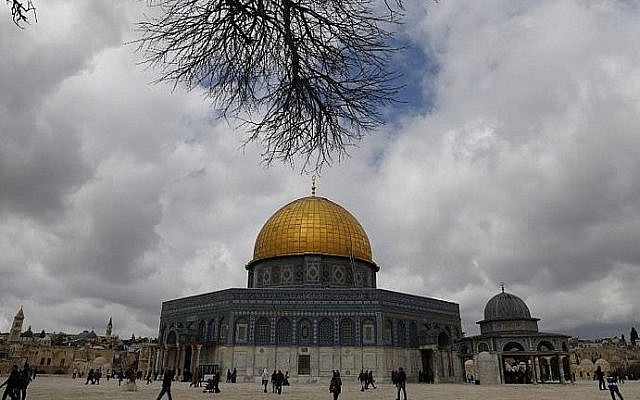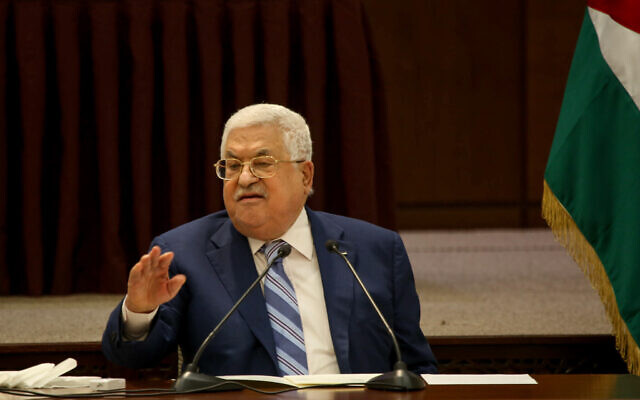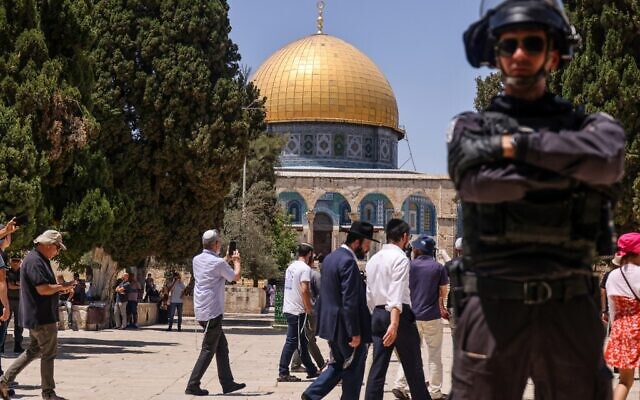Amman warns ruling in favor of teens who recited ‘Shema Yisrael’ is also ‘a gross violation of international decisions’; Hams warns decision ‘plays with fire’

Jordan on Sunday panned an Israeli court’s dramatic ruling in favor of three Jewish teenagers who bowed down and recited the “Shema Yisrael” prayer at Jerusalem’s Temple Mount, warning that it flew in the face of international law.
“The decision allows extremists to hold ceremonies at the Al-Aqsa compound,” a statement issued by the Jordanian foreign ministry read.
By praying at the site, the teenagers violated a longstanding but informal arrangement that dictates that Jews are allowed to visit the site but not pray there.
“The ruling is legally null and void according to international law, which does not recognize the authority of the Israeli judicial system on occupied Palestinian territories from 1967, including East Jerusalem,” it said, adding that the ruling “is a gross violation of international decisions relating to Jerusalem, including resolutions passed by the United Nations Security Council, which all clarify that the status quo must be maintained in the holy city.”
The office of Palestinian Authority President Mahmoud Abbas called the decision “a serious violation of the historical status quo” and urged Washington “to intervene urgently to stop the Israeli attacks on our people and their sanctities.”
In comments that also referenced Israelis’ upcoming Jerusalem Day “Flag March” through the Old City, Abbas’s office called “on our people to challenge and confront these attacks.”

The Hamas terror group said the ruling “plays with fire while crossing all red lines, and is a dangerous escalation for which the leaders of the occupation shall bear the consequences.”
Earlier, the Prime Minister’s Office issued a statement clarifying that no changes were planned in the status quo on the Mount, which house the Al-Aqsa Mosque
“There is no change, nor is any change planned, on the status quo of the Temple Mount,” the statement said. “The Magistrate Court’s decision is focused exclusively on the issue of the conduct of the minors brought before it, and does not constitute a broader determination regarding freedom of worship on the Temple Mount. With regard to the specific criminal case in question, the government was informed that the state will file an appeal to the District Court.”

In his Sunday ruling, Judge Zion Saharay said that he did not consider bowing down and reciting a prayer sufficient cause to curtail freedom of religion.
Saharay cited Police Chief Kobi Shabtai in comments from last May that officers would ensure freedom of religion for “all residents of the country and the territories” at the flashpoint holy site.
But according to a report by Channel 12, police officials denied this, accusing the judge of distorting remarks made by Shabtai.
“The court ruling is based on statements made by the police commissioner when in practice, he wasn’t talking about the Temple Mount,” an unnamed police official was quoted as saying.
“When the commissioner speaks about freedom of worship, he does not refer to the Temple Mount, where the status quo determined by government policy and High Court rulings over the years is maintained,” the police official added. “This is a case of a distorted interpretation of his remarks.”
The State Attorney’s Office said it would appeal Saharay’s ruling.
The Temple Mount, known to Muslims as the Haram al-Sharif, is the holiest site for Jews and site of the third holiest shrine in Islam. It is the emotional epicenter of the Israeli-Palestinian conflict, and tensions there helped ignite the 11-day Gaza war in May.
Jordan has long maintained that its treaties with Israel grant it custodianship over Jerusalem’s Christian and Muslim holy sites; while Israel has never accepted this claim, it grants day-to-day administration of the Temple Mount to the Jordan-funded Waqf.
The agreement by which Jews can visit the Mount ut not pray there has frayed in recent years, as groups of Jews, including hardline religious nationalists, have regularly visited and prayed at the site. The Israeli government, nonetheless, says it is committed to maintaining the status quo, despite reports indicating it turns a blind eye to Jews seeking to pray at the site.
During last month’s convergence of the Muslim holy month of Ramadan and the Jewish holiday of Passover, the site saw nearly daily clashes between Israeli security forces and Palestinian rioters.
The heightened tensions in the capital drew a harsh response from Jordan at the time, whose prime minister used unusually hostile language to condemn “Zionist sympathizers,” and what he called Israel’s “occupation government.” Jordanian King Abdullah slammed the Jewish state for allowing Jewish pilgrims to enter the site and called on the Israeli government to respect “the historical and legal status quo” there.
As reported by The Times of Israel
